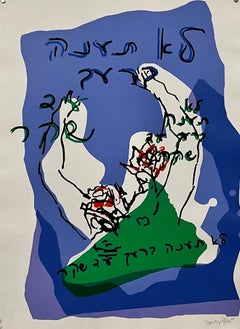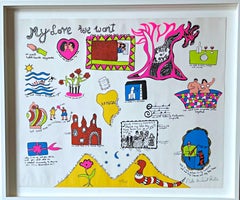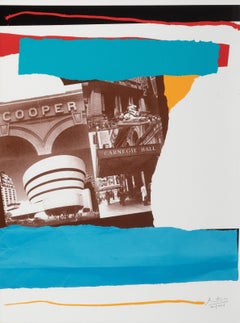Judy Rifka Figurative Prints
American, b. 1945
Judy Rifka (b. 1945) is an American artist active since the 1970s as a painter and video artist. She works heavily in New York City's Tribeca and Lower East Side and has associated with movements coming out of the area in the 1970s and 1980s such as Colab and the East Village, Manhattan art scene.[to
2
Overall Width
to
Overall Height
to
1
1
9
864
383
364
310
2
2
2
2
1
2
Artist: Judy Rifka
Judy Rifka Abstract Expressionist Contemporary Lithograph Hebrew 10 Commandment
By Judy Rifka
Located in Surfside, FL
Judy Rifka (American, b. 1945)
44/84 Lithograph on paper titled "Thou Shalt Not Bear False Witness against Thy Neighbor"; Depicting an abstract composition in blue, green, red and black tones with Hebrew script. Judaica interest. (I have seen this print described as a screenprint and as a lithograph)
Hand signed in pencil and dated alongside an embossed pictorial blindstamp of a closed hand with one raised index finger. Solo Press.
From The Ten Commandments Kenny Scharf; Joseph Nechvatal; Gretchen Bender; April Gornik; Robert Kushner; Nancy Spero; Vito Acconci; Jane Dickson; Judy Rifka; Richard Bosman and Lisa Liebmann.
Judy Rifka (born 1945) is an American woman artist active since the 1970s as a painter and video artist. She works heavily in New York City's Tribeca and Lower East Side and has associated with movements coming out of the area in the 1970s and 1980s such as Colab and the East Village, Manhattan art scene. A video artist, book artist and abstract painter, Rifka is a multi-faceted artist who has worked in a variety of media in addition to her painting and printmaking. She was born in 1945 in New York City and studied art at Hunter College, the New York Studio School and the Skowhegan School of Painting and Sculpture in Maine.
Rifka took part in the 1980 Times Square Show, (Organized by Collaborative Projects, Inc. in 1980 at what was once a massage parlor, with now-famous participants such as Jenny Holzer, Nan Goldin, Keith Haring, Kenny Scharf, Jean-Michel Basquiat, and Kiki Smith, the roster of the exhibition reads like a who’s who of the art world), two Whitney Museum Biennials (1975, 1983), Documenta 7, Just Another Asshole (1981), curated by Carlo McCormick and received the cover of Art in America in 1984 for her series, "Architecture," which employed the three-dimensional stretchers that she adopted in exhibitions dating to 1982; in a 1985 review in the New York Times, Vivien Raynor noted Rifka's shift to large paintings of the female nude, which also employed the three-dimensional stretchers. In a 1985 episode of Miami Vice, Bianca Jagger played a character attacked in front of Rifka's three-dimensional nude still-life, "Bacchanaal", which was on display at the Museum of Art Fort Lauderdale. Rene Ricard wrote about Rifka in his influential December 1987 Art Forum article about the iconic identity of artists from Van Gogh to Jean-Michel Basquiat and Keith Haring, The Radiant Child.The untitled acrylic painting on plywood, in the collection of the Honolulu Museum of Art, demonstrates the artist's use of plywood as a substrate for painting. Artist and writer Mark Bloch called her work "imaginative surfaces that support experimental laboratories for interferences in sensuous pigment." According to artist and curator Greg de la Haba, Judy Rifka's irregular polygons on plywood "are among the most important paintings of the decade".
In 2013, Rifka's daily posts on Facebook garnered a large social media audience for her imaginative "selfies," erudite friendly comments, and widely attended solo and group exhibitions, Judy Rifka's pop art figuration is noted for its nervous line and frenetic pace. In the January 1998 issue of Art in America, Vincent Carducci echoed Masheck, “Rifka reworks the neo-classical and the pop, setting all sources in quotation for today’s art-world cognoscenti.” Rifka, along with artists like David Wojnarowicz, helped to take Pop sensibility into a milieu that incorporated politics and high art into Postmodernism; Robert Pincus-Witten stated in his 1988 essay, Corinthian Crackerjacks & Passing Go that "Rifka’s commitment to process and discovery, doctrine with Abstract Expressionist practice, is of paramount concern though there is nothing dogmatic or pious about Rifka’s use of method. Playful rapidity and delight in discovery is everywhere evident in her painting." In 2016, a large retrospective of Rifka's art was shown at the Jean-Paul Najar Foundation in Dubai. In 2017, Gregory de la Haba presented a Rifka retrospective at the Amstel Gallery in The Yard, a section of Manhattan described as "a labyrinth of small cubicles, conference rooms and small office spaces that are rented out to young entrepreneurs, professionals and hipsters". In 2019 her video Bubble Dancers New Space Ritual was selected for the International Istanbul Bienali.
Alexandra Goldman Talks To Judy Rifka About Ionic Ironic: Mythos from the '80s at CORE:Club and the Inexistence of "Feminist Art" Whitehot Magazine of Contemporary Art. She was included in "50 Contemporary Women Artists", a book comprising a refined selection of current and impactful artists. The foreword is by Elizabeth Sackler of the Brooklyn Museum’s Sackler Center for Feminist Art. Additional names in the book include sculptor and carver Barbara Segal...
Category
1980s Pop Art Judy Rifka Figurative Prints
Materials
Lithograph, Screen
"Thou Shalt Not Bear False Witness Against Thy Neighbor", Signed/N Lithograph
By Judy Rifka
Located in New York, NY
Judy Rifka
"Thou Shalt Not Bear False Witness Against Thy Neighbor" (The Ninth Commandment), 1987
6 Color Lithograph on Dieu Donne Handmade Paper
24 × 18 inches
Edition Artist's Proof 2/15, aside from the regular edition of 84
Signed and numbered in graphite on the front
Unframed
This work was created as part of the 1987 portfolio "The Ten Commandments", in which ten top Jewish American artists were each invited to choose an Old Testament commandment to interpret in contemporary lithographic form. The "Chosen" artists were, in order of Commandment: Kenny Scharf, Joseph Nechvatal, Gretchen Bender...
Category
1980s Abstract Judy Rifka Figurative Prints
Materials
Lithograph
Related Items
Niki de Saint Phalle, My Love We Wont, Rare whimsical 1960s silkscreen Signed/N
By Niki de Saint Phalle
Located in New York, NY
Niki de Saint Phalle
My Love We Wont, 1968
Lithograph and silkscreen on wove paper
Signed and numbered 51/75 in graphite pencil on the front
Frame included: elegantly floated and framed in a museum quality white wood frame with UV plexiglass
From the Brooklyn Museum, which has an edition of this work in its permanent collection:
"Throughout her long and prolific career Niki de Saint Phalle, a former cover model for Life magazine and French Vogue, investigated feminine archetypes and women’s societal roles. Her Nanas, bold, sexy sculptures...
Category
1960s Pop Art Judy Rifka Figurative Prints
Materials
Screen, Pencil, Lithograph, Mixed Media
$10,000
H 22.5 in W 27 in D 2 in
Cultural Institutions, Abstract Expressionist Lithograph by Robert Motherwell
By Robert Motherwell
Located in Long Island City, NY
This print by Robert Motherwell is part of an 8-piece portfolio published by The New York Graphic Society in 1983 and includes works from Red Grooms, Robert Indiana, Alex Katz, R.B. ...
Category
1980s Abstract Expressionist Judy Rifka Figurative Prints
Materials
Lithograph
Eduardo Chillida Spanish Artist 1980 Original Poster lithograph Unsigned
By Eduardo Chillida
Located in Miami, FL
"Eduardo Chillida (Spain, 1924-2002)
'Museum of Art Carneige Institute Pittsburg', 1980
Original poster from 1980
lithograph on paper
12.6 x 25.6 in. (32 x 65 cm.)
Unsigned
Unframed
...
Category
1980s Abstract Judy Rifka Figurative Prints
Materials
Lithograph
abstract composition
By Marie Raymond
Located in Belgrade, MT
This color lithograph is part of my private collection since the 1970's. Marie Raymond was a pioneer post WWII painter of her generation. She was a lyrical abstractionist of her time...
Category
Mid-20th Century Abstract Expressionist Judy Rifka Figurative Prints
Materials
Color, Lithograph
Red Grooms, "Expedition" (aka "EAT", aka "Stockholm Print") Signed/N, Framed
By Red Grooms
Located in New York, NY
Red Grooms
"Expedition" (aka "EAT", aka "Stockholm Print"), 1973
Silkscreen on 100% rag paper
Pencil signed, dated and numbered recto (front); Stamped in black on verso "© Copyright ...
Category
1970s Pop Art Judy Rifka Figurative Prints
Materials
Screen
$1,000
H 15.25 in W 16.25 in D 0.4 in
Original Lithograph PENCIL SIGNED Ed. 30/150 Affiche avant la lettre LAS MUJERAS
By Rufino Tamayo
Located in New York, NY
Here we have an Original Pencil Signed and Numbered Lithograph by Rufino Tamayo, famous Mexican American Artist…. known for abstract Figurative Expressionist images
There was only a...
Category
1960s Abstract Expressionist Judy Rifka Figurative Prints
Materials
Lithograph
$3,400
H 33 in W 25 in D 1 in
Alexander Calder lithograph (derrière le miroir)
By Alexander Calder
Located in NEW YORK, NY
Alexander Calder Lithograph c. 1967 from Derrière le miroir:
Lithograph in colors; 15 x 11 inches.
Very good overall vintage condition; well-preseved.
Unsigned from an edition of u...
Category
1960s Abstract Judy Rifka Figurative Prints
Materials
Lithograph, Offset
Alexander Calder lithograph derrière le miroir
By Alexander Calder
Located in NEW YORK, NY
Alexander Calder Lithograph c. 1971 from Derrière le miroir:
Lithograph in colors; 15 x 11 inches.
Very good overall vintage condition; well-preseved.
Unsigned from an edition of u...
Category
1970s Abstract Judy Rifka Figurative Prints
Materials
Lithograph, Offset
$255 Sale Price
40% Off
H 15 in W 11 in
Moving the Wind, Karel Appel
By Karel Appel
Located in Fairfield, CT
Artist: Karel Appel (1921-2006)
Title: Moving the Wind
Year: 1974
Medium: Silkscreen on Somerset paper
Edition: 88/110, plus proofs
Size: 27 x 39.25 inches
Condition: Good
Inscriptio...
Category
1970s Pop Art Judy Rifka Figurative Prints
Materials
Screen
Bacon, Le Boeuf, 1986
By Francis Bacon
Located in Fairfield, CT
Artist: After Francis Bacon (1909-1992)
Title: Le Boeuf, exhibition poster
Year: 1986
Medium: Offset Lithograph on premium paper
Size: 30.75 x 18 inches
Condition: Excellent
Notes: Published by Foundation Maeght
FRANCIS BACON (1909-1992) Francis Bacon has a distinctive style as a figure painter. In his mature style, developed in the 1950s, the paintings include images of either friends or lovers, or images of people found in movie stills...
Category
1980s Abstract Expressionist Judy Rifka Figurative Prints
Materials
Lithograph, Offset
3 (Three), Limited Edition from the Numbers portfolio (Sheehan 46-55) - FRAMED
By Robert Indiana
Located in New York, NY
Robert Indiana
3, from the original Numbers portfolio (Sheehan 46-55), 1968
Color Silkscreen on Wove Paper
Limited Edition of 2500
Not Signed
Frame Included
This classic 1960s silks...
Category
1960s Pop Art Judy Rifka Figurative Prints
Materials
Screen
$1,000
H 12.75 in W 10.25 in D 1.25 in
Pierre Alechinsky Belgian 1982 Original FIFA Soccer World Cup Poster lithograph
By Pierre Alechinsky
Located in Miami, FL
"Pierre Alechinsky (Belgium, 1927)
'Dribbling (Alicante)', 1982
Original poster from 1982 FIFA Soccer World Cup
lithograph on paper
37.5 x 23.7 in. (9...
Category
1980s Abstract Judy Rifka Figurative Prints
Materials
Lithograph
Judy Rifka figurative prints for sale on 1stDibs.
Find a wide variety of authentic Judy Rifka figurative prints available for sale on 1stDibs. You can also browse by medium to find art by Judy Rifka in lithograph, screen print and more. Much of the original work by this artist or collective was created during the 1980s and is mostly associated with the Pop Art style. Not every interior allows for large Judy Rifka figurative prints, so small editions measuring 18 inches across are available. Customers who are interested in this artist might also find the work of Ronnie Cutrone, Milton Glaser, and Bob Pardo. Judy Rifka figurative prints prices can differ depending upon medium, time period and other attributes. On 1stDibs, the price for these items starts at $950 and tops out at $950, while the average work can sell for $950.


